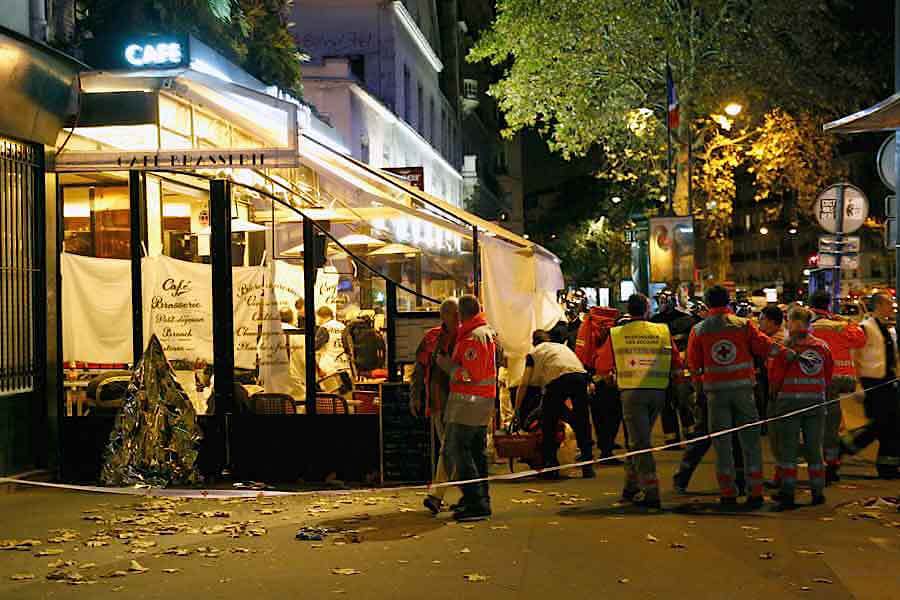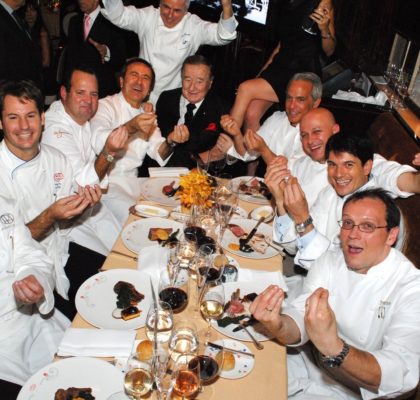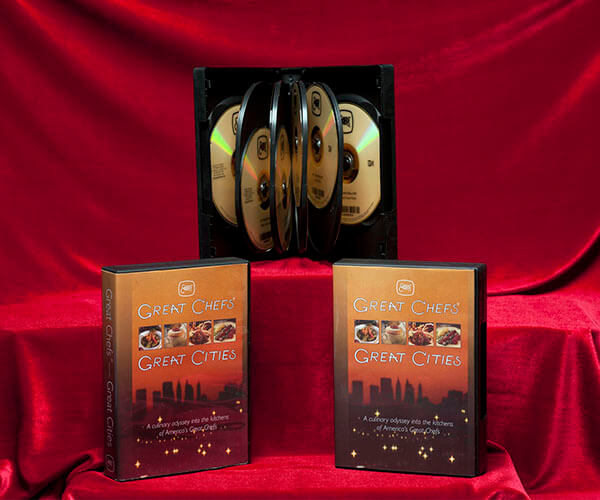WHY WE DINE
By John Mariani

The terrorists bombings in Paris aimed deliberately at people enjoying themselves at cafes, bistros, stadiums and theaters reminded me, sadly yet again, of the real importance of such leisure activities at a time when they must be treasured. The article below originally appeared on the occasion of the 9/11 bombings. I feel it worth while publishing again today.
On the day the day the World Trade Center was destroyed, Sirio Maccioni, owner of New York’s famous restaurant, Le Cirque 2000, called then Mayor Rudy Giuliani to ask how he might help in the crisis. Giuliani said two words: “Stay open.” That night Le Cirque did only 65 covers. Two weeks later, on a Saturday night, the restaurant served 260.
That sentiment has always carried weight with me, not only because sitting down to a meal requires the harried mind to re-focus attention on a basic human ritual but because it truly helps to return to a normal need. After hearing of a tragedy, the appetite may flag, eating may be the last thing on one’s mind, and dining seems downright frivolous. But to restore one’s appetite is to restore one’s strength, as anyone who has long been sick knows.
A year earlier when I heard the news that my mother had passed away overnight, I was tying my tie in a room at the Crillon Hotel in Paris, ready to go down to dinner. The news had the obvious effect of bringing me to my knees, but after commiserating with my wife, I determined that going down to dinner would be the very best thing, rather than stay in the room and weep. We went to dinner, sure that my mother, who gave me life, nurtured me as an infant, and imbued me with a love of good food, a woman who was a great hostess and loved nothing more than going out to a fine restaurant, would have insisted I do so. And so, we ate very well and drank a very fine wine, toasting my mother as she so richly deserved.
As a food and travel writer what I do for a living may seem odd (T.S. Eliot wrote, “We measure out our lives in coffee spoons,” but I measure out mine in morsels of foie gras), but, whenever I think of it as ephemeral to the great issues of the day, I am reminded of a scene in the play based on The Diary of Anne Frank, in which the family, isolated for months in an attic but still believing they will soon be out, fantasizes about the first thing they’ll do when they return to the world outside. Anne (left) says she yearns to go to a dance. The teenage boy wants to go to a movie, a western movie! And the adults all start remembering and dreaming of a wonderful pastry shop, a good stew, a romantic restaurant with thick linen and fine wines. None, not one, declares that the first thing he wants to do is to change the political structure of Europe. This scene made me realize not only that deprivation takes away freedoms of movement but also access to the most wonderful sights, sounds, and tastes of life–the very things we live for until they are taken away from us. Every human being on earth who has ever gone hungry thinks first of survival, then of doing something seemingly superficial–a dance, a western movie, a visit to a restaurant. For when all goes well, when the doctor cuts out the cancer, when debt is retired, when the debris is cleared away, returning to normal means returning to those things that make life worth living.
During World War II director Frank Capra made a series of powerful propaganda films entitled “Why We Fight,” and if seeing yet again the cheesecake photos (an interesting turn of phrase) of Rita Hayworth and Betty Grable in servicemen’s lockers seems pointedly nostalgic, that does not destroy its touching allure. “Why We Dine” is as reasonable a proposition as any other, once we survive the inevitable rigors and horrors of life that must be endured. “Animals feed, man eats,” said Brillat-Savarin, “but only a man of culture knows how to dine.”
So I carry on extolling and criticizing our world’s food culture, sometimes whimsically, sometimes with vitriol. For the importance of dining out, and drinking good wine, and falling in love under the spell of candlelight at the dinner table is to enjoy all that terrorists–especially those whose religious fanaticism seeks to deprive people of all pleasure–would seek to destroy. By indulging in life’s passions we do much more than live out our lives. We gain strength in the belief that they are part of the goodness of man.
Eat well, be well.
John Mariani writes for Esquire Magazine and also was a contributor to the Great Chefs Magazine
Add to Favourites









